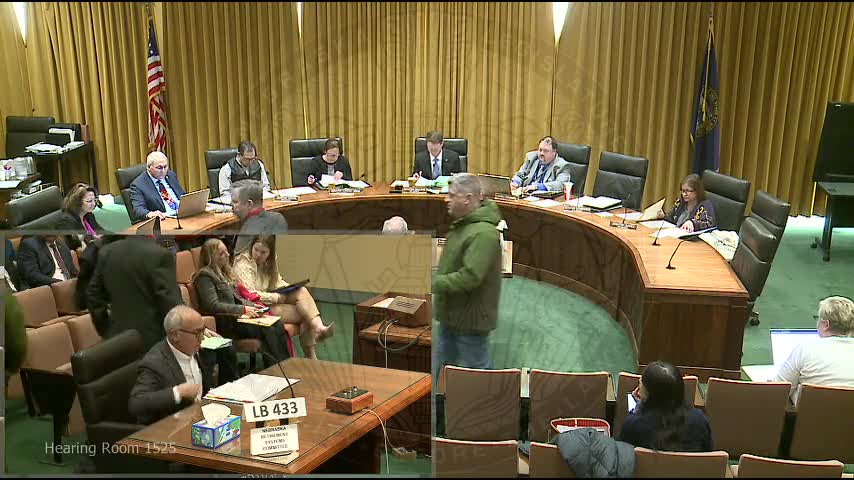Committee hears bill to make deputy directors and agency attorneys discretionary, allow temporary rehiring without 120‑day wait
Get AI-powered insights, summaries, and transcripts
Subscribe
Summary
Senator Tony Sorrentino introduced LB433 to make deputy directors and agency attorneys discretionary employees and to allow rehiring former permanent employees as temporary hires without the current 120‑day break in service for retirement contributions.
Senator Tony Sorrentino, representing Legislative District 39, introduced LB433 on behalf of the Department of Administrative Services, saying the bill “was brought at the request of the Department of Administrative Services” and that its intent is “to, 1, exclude deputy directors and attorneys in the state personnel system, thus making them discretionary employees, and 2, allows previous permanent employees to be rehired as a temporary employee without having to wait for the hundred and 20 day break in service required by the State employee retirement system.”
Supporters told the Retirement Systems Committee that exempting deputy directors and attorneys from the State Personnel System would allow agency leaders to recruit and retain executive and legal talent by offering discretionary pay and clearer at-will authority. Lee Will of the Department of Administrative Services said the change would help agencies remain competitive with other public-sector employers and the private market and that attorneys are licensed professionals similar to MDs and pharmacists already exempted in statute.
Department of Health and Human Services Chief Legal Officer Beau Botelho testified that pay limitations have led the department to lose experienced attorneys and that a discretionary classification would aid recruitment. Sorrentino and DAS cited examples where rehiring a permanent employee on a temporary basis—such as nurses at the Nebraska Department of Veterans Affairs—was constrained by the current 120-day rule for retirement contributions.
The Nebraska State Bar Association opposed the bill. Tim Hruza, speaking for the bar, said the association’s core concern is protecting attorney independence and preventing real or perceived retribution when government lawyers give legally required advice that may displease superiors. Hruza noted the bill (or versions of it) has been introduced in prior sessions and said a narrower compromise—making deputy directors at-will while preserving protections for agency legal counsel—had been acceptable in earlier discussions.
Committee members asked for clarifications and fiscal information. Senator Tom Conrad requested data on how much the state currently spends on outside legal contracts as part of weighing the fiscal tradeoffs of paying higher in‑house salaries; representatives agreed to follow up.
No committee vote occurred at the hearing. Senator Sorrentino closed by asking the committee to give the bill “strong consideration” and to continue negotiations on potential amendments.
Ending: The hearing showed a split between administrative efficiency and recruitment aims on one side and professional‑ethics and independence concerns from the State Bar on the other; further negotiation, possible ethics advisory input and fiscal analysis were requested by committee members.
